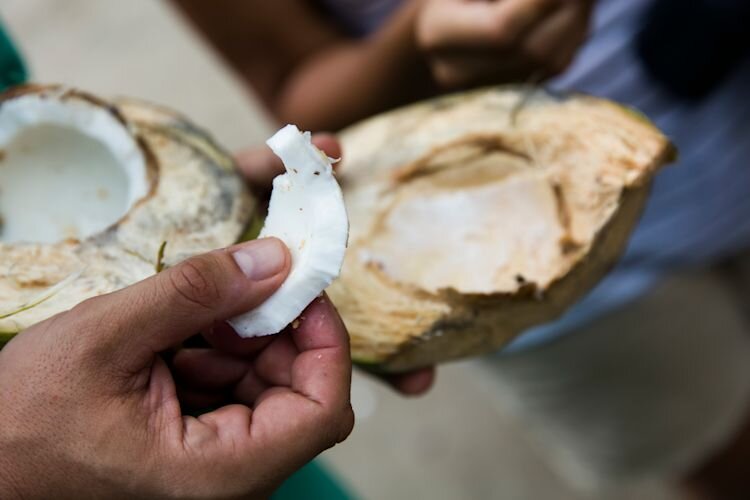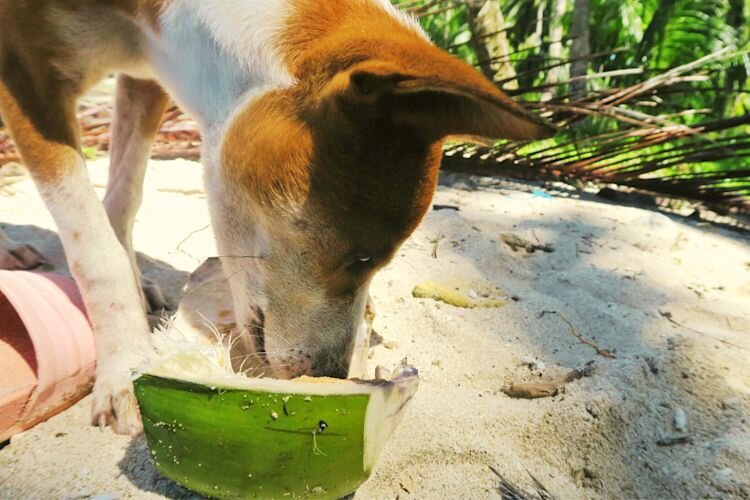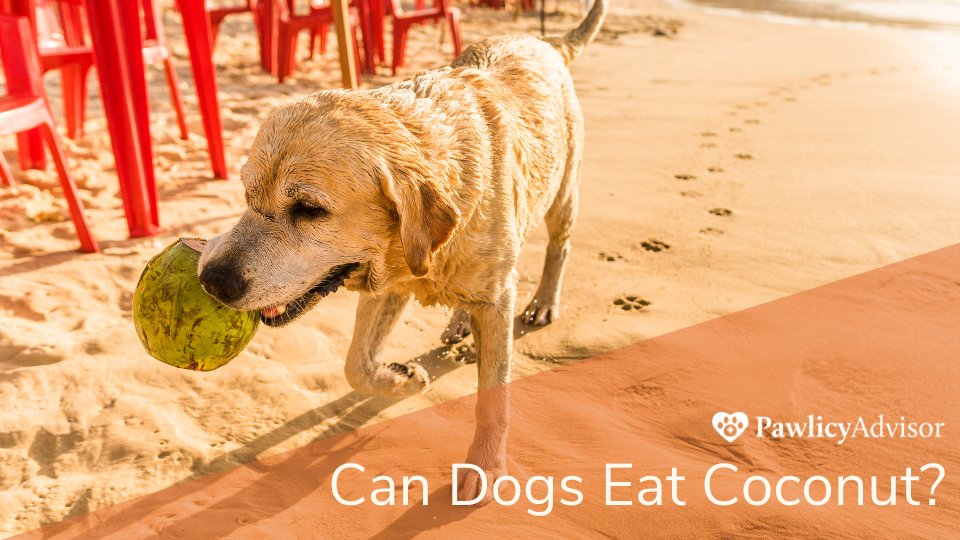Can Dogs Eat Coconut? Here's Everything You Need to Know
Many pet parents personally enjoy coconut and know about the benefits it can offer in its different forms. But how does this people's food pertain to pups - can dogs have coconut too?
It's generally safe for dogs to eat coconut, but there are some exceptions you should know before serving this sweet fruit to your four-legged friend.
Here's everything you need to know.
Table of Contents:
- Can dogs eat coconut?
- When is coconut bad for dogs?
- Can dogs eat coconut oil?
- Can dogs eat coconut milk?
- Can dogs eat dried coconut?
- What about coconut water?
- How to safely feed your dog coconut
- Key Takeaways
Pro Tip: If your dog eats something that causes a gastric issue and requires expensive treatment, pet insurance can ensure that you they receive the emergency care they need while minimizing your financial risk. Depending on the plan you choose, you can be reimbursed for up to 100% of the costs for covered veterinary services once you've met your deductible.
Can dogs eat coconut?
Dogs can safely eat coconut when served in moderate amounts. In fact, there are many benefits of coconut for dogs beyond the great taste. The meat of the fruit is very hydrating, packed with healthy fats, carbs, and proteins that build strong muscles and generate energy to fuel our furry friends.
Coconut is also rich in vitamins, minerals, and fiber. Among the key nutrients is manganese, a mineral that promotes metabolic functioning and bone health. It’s also high in antioxidants that support the immune system and repair damage.
Lauric acid is also found in coconut, which is known to combat viruses, treat yeast infections, and decrease inflammation (the leading cause of arthritis). Therefore, many pet parents often feed dogs coconut as a natural home remedy for joint pain relief.
Coconut for dogs is also praised for its ability to improve the skin and coat. It soothes irritated tissue, acts as a moisturizer, and contributes to shinier, softer fur. The tropical fruit has skin-protecting properties and promotes the healing of wounds, so you can often find it listed as an ingredient in dog shampoos and salves - but always consult with your veterinarian before applying this directly to your dog’s skin, as it can make some conditions worse.
There are many benefits of coconuts for dogs and the fruit can safely be served as an occasional snack. However, there are some considerations you should consider before offering it to your dog.
When is coconut bad for dogs?
Coconut isn’t toxic to dogs, but it contains medium-chain triglycerides, which might cause gastric upset and bloat. If your dog eats coconut in large quantities, they could experience unpleasant gastrointestinal (GI) issues, such as diarrhea and/or constipation.
Also, the shell of a coconut is bad for dogs because it’s very hard, difficult to chew, and can result in choking or intestinal blockage. The hairy texture may also affect your pup’s bowel movements as the fibers gather in the intestines, so be sure to never give dogs coconut shells when offering the fruit as a treat. Stick to fresh, ripe meat instead.

If your dog eats coconut and shows signs of upset stomach, diarrhea, or vomiting, stop serving it and contact your vet. It’s always best to check with them first before introducing new foods into your dog’s diet.
Pro Tip: Dog insurance promotes a great relationship between you, your vet, and your pet by lifting the concern over treatment cost. Rather than letting finances dictate the level of care your companion receives, you'll have peace of mind knowing that you can go to the vet at the first sign of symptoms. The reimbursement rate you receive depends on the pet insurance plan you choose and how you customize the policy's flexible options.
Can dogs eat coconut oil?
Dogs can have coconut oil, as long as it’s served in moderate quantities. The ingredient has become very popular as a healthier alternative to traditional cooking oils, but there is not much research that supports that coconut oil offers the same benefits to canines as it does to humans. Although the adverse effects of coconut oil in dogs are rare, there are several factors you should consider:
- Some studies have confirmed that coconut oil can increase cholesterol levels in dogs. It is also high in calories and fats, which can lead to weight gain and obesity.
- Research has shown that a diet rich in saturated fats can negatively impact dogs’ unique ability to smell. More research is needed to better understand this relationship, but dog owners (especially those who have working dogs) are advised to be cautious.
- Coconut oil is also high in fat content, so be careful feeding it to smaller pets as it could cause pancreatitis, a potentially life-threatening condition.
There is always a risk of an allergic reaction when introducing new foods to your dog’s diet. If you notice anything out of the ordinary, stop serving it immediately and avoid the ingredient in topical products.
How to feed dogs coconut oil
If you’re looking for good-quality coconut oil, opt for non-hydrogenated, virgin coconut oil. Experts recommend starting with small doses** so that you can monitor how your pet reacts to it. Begin with 1/4 teaspoon per day** for small breed dogs or a full tablespoon per day for bigger dogs and increase the dose gradually.
If your pet doesn’t show any signs of intolerance (such as diarrhea or weight gain) after two weeks, increase the amount to one teaspoon per 10 pounds of body weight. The recommended maximum daily amount is one tablespoon per 30 lbs of body weight.
Coconut oil can be given one to two times a day, preferably mixed in your pet’s regular food, unless your pet is obese or overweight. In that case, don’t give them coconut oil more than once a day. If you’re applying coconut oil on dogs, rub a little bit onto your hands, then gently pat your dog’s coat and massage it into their skin.
Can dogs have coconut milk?
Dogs can have coconut milk but only in small amounts. Coconut milk is not toxic to dogs and can even offer a few health benefits, such as strengthening the immune system, freshening their breath, and improving the appearance of their coat. However, too much coconut milk or coconut milk-based foods might cause diarrhea or loose stools in your dog. In addition, coconut milk is often overly processed and can contain additives that your pet doesn’t need.
Tips for giving your dog coconut milk
If possible, feed your pet organic coconut milk as non-organic varieties can contain harmful additives and pesticides. Introduce coconut milk gradually into your pet’s diet (a few milliliters per day) so that their system can adjust to it. Try preparing homemade dog treats or making ice cubes with unsweetened coconut milk.
Can dogs eat dried coconut?
Dried coconut is popular a food for people, but some brands contain high amounts of added sugar that can cause GI upset or weight gain in dogs. Avoid sweets made up of coconut, especially if chocolate is an ingredient.
What about coconut water?
Coconut water is great for dogs. It’s rich in nutrients like magnesium, manganese, iron, zinc, and calcium, as well as enzymes and electrolytes that help maintain optimal pH levels in your dog’s body. Compared to the flesh of the fruit, coconut water is also lower in sugar, salt, and calories - so it’s perfect for boosting your pup’s energy levels while helping them stay hydrated at the same time.
Note that natural, 100% pure coconut water from fresh, baby coconuts is safe for dogs, but you should always double-check store-bought variations because it can contain added sugars, additives, and preservatives that can be harmful to pets.

How to safely feed your dog coconut
Although our canine companions are omnivores and don’t really need coconut in their diet, it offers a safe, healthy, and non-toxic treat that many of them enjoy. If you decide to let your pet indulge in coconut, you need to make sure you’re feeding it safely.
Coconut meat is available raw and dried, and typically comes in flakes or shredded. Don’t give your pet sweetened coconut because it contains added sugars and is commonly used in baking. Choose unsweetened varieties and be sure to feed them in moderate amounts.
If you are planning to purchase whole coconuts, remember to remove the outer shell and the husk, being careful to keep them away from your pet as they can be harmful if swallowed.
Key Takeaways
- Coconut is an excellent way to include nutrients in your dog’s diet.
- Too much coconut can cause stomach upset, so try to apply it in moderation and with caution.
- Dogs can also safely consume coconut oil in moderate amounts, as well as unsweetened coconut milk and coconut water. They should, however, stay away from dried coconut as it is often loaded with sugar.
- If you’re planning on introducing coconut into your dog’s diet in any form, start small and increase the dose gradually.
- Be sure to speak to your vet before giving your pet any new foods, including coconut.
Do you want to find the best pet insurance?
Let's analyze your pet's breed, age, and location to find the right coverage and the best savings. Ready?
Analyze My PetAbout Pawlicy Advisor
The pet insurance marketplace endorsed by veterinarians, at Pawlicy Advisor we make buying the best pet insurance easier. By comparing personalized coverage and pricing differences we can save you a ton of money, up to 83% in some instances!
Instantly Compare Pet Insurance Plans
Guides
Determine If Pet Insurance Is Worth It
Comparison Charts
Find Your State
Dog Insurance
DVM
Ricky Walther, DVM, is a small animal general practitioner in the greater Sacramento, California area. Realizing the positive financial and medical impact that pet insurance can provide for pet parents and the profession, he lends support and advice to companies like Pawlicy Advisor "The Pet Insurance Marketplace") that simplify the process of connecting with veterinary financing resources.
